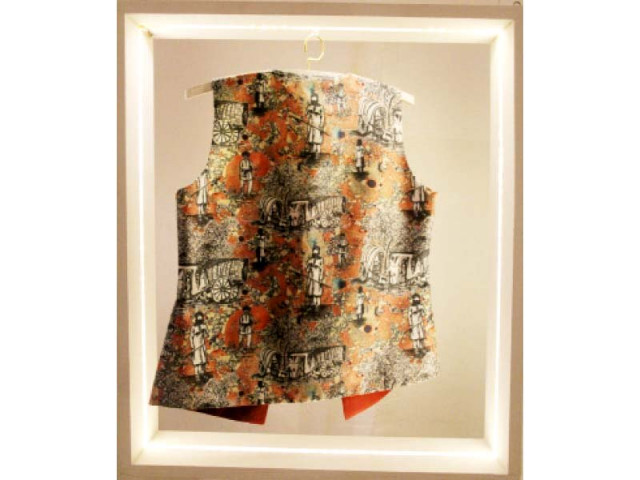Political comment: Waistcoats inspired by ‘the great vivisection’
Work of NCA’s textile design students being showcased

Select work by graduating
student Khushnuma Akbar being showcased at the
exhibit. PHOTO: AYESHA MIR/EXPRESS
Student Soohna Khalil said her work was inspired by ralli. She said she had incorporated folk stories from Sindh in her work. Khalil said these included Sassi Punnu, Sohni Mahiwal, Umar Marvi and Lilan Chanesar among others. “I have taken words from the poetry of Shah Abul Latif Bhittai and used them as motifs in my work,” she said.
Khalil said while ralli was usually made of cotton, she had used materials like raw silk and organza. She said her pieces could be used as wall hangings, bedspreads, upholstery and blinds.
Another student, Sana binte Khurram, said her work was premised on female infanticide and foeticide. She said it explored how the social practice wreaked havoc on a mother’s office. Khurram said her work depicted the various stages a foetus underwent overtime. “Each piece is related to the form of the womb, how foetuses form, enlarge overtime and are then aborted,” she said.
Nimra Ahmed displayed a myriad of objects such as mobile phone covers, bags and mugs embossed with the faces of politicians. She said she had been inspired by viewing politics from various perspectives. Ahmed said she had aspired to further satire in popular culture through her work. She said her work depicted one-liners, slogans and landmark achievements in politics, sports and the military.
Khushnuma Akbar, who created a series of waistcoats, said her work was inspired by the vivisection of India. “I interviewed my maternal grandfather and then sketched according to the stories narrated by him,” Akbar said. She said all the waistcoats were double-sided. “I have tried to show linguistic differences, missing families and have employed trains, railway lines, barbed wire, identity, thumbprints and so on as motifs,” Akbar said.
Mahnur Ahmed said her work was a tribute to her village near Multan. Ahmed, who displayed 18 cushions embossed with views of her village, said her village was steadily getting urbanised and losing its soul. Iman Pervaiz, showcased a plethora of clutches. She said most people tended to pretend to be what they were not. Pervaiz said the imposed superficiality eventually obliterated their very identity. She said her work explored this theme.
Published in The Express Tribune, January 15th, 2016.


















COMMENTS
Comments are moderated and generally will be posted if they are on-topic and not abusive.
For more information, please see our Comments FAQ